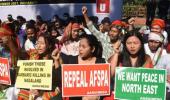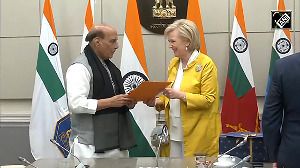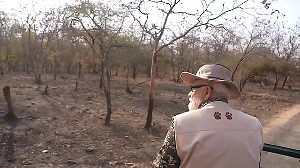'We shouldn't allow it to become a rallying point for others in the region against the army.'

"The tribal way of life values honour. Somebody has to reach out and tell them that a mistake happened," says Lieutenant General Konsam Himalay Singh, PVSM, UYSM, AVSM, YSM (retd), the first three-star general from Manipur.
The general served nearly forty years in the Indian Army and is currently a member of the Manipur government's consultative committee on Naga peace talks.
"If AFSPA is repealed, anti-national forces will have huge control over the government in a few states in the region," General Himalay Singh tells Rediff.com's Archana Masih.
The loss of life of civilians in Nagaland is an extremely unfortunate incident. It was an operation that has gone horribly wrong.
The Indian military does not shoot innocent people; it is an aberration. The military cannot be broad brushed as being a brutal force because of this tragic incident which took place due to mistaken identity. The intelligence inputs were very credible according to the army.
In sensitive areas like Jammu and Kashmir and the North East, security forces have to be extremely careful while engaging the target.
There are several intelligence inputs that come to the security forces and based on the information received operations are launched against insurgents.
Launching an operation without fool-proof and credible intelligence can lead to innocent people being killed.
The army should have been much more careful, but I would reiterate that the military can't be blamed because an incident of mistaken identity takes place very rarely in the army.
Mon district is home to the Konyak tribe which is the most ferocious tribe in Nagaland. They are known to have practiced head hunting till the 1960s-1970s.
The retaliation and firing in self defence by the army must have been forced by the violent reaction of the locals who were emotionally charged at the time.
While the locals reacted like they did, the military also has a mechanism of self defence when it is attacked. In fact, everybody has the right to self defence under the Indian Penal Code.
One soldier was attacked and killed.
Repealing the Act is not the answer
The state and other political parties have asked for the removal of the Armed Forces Special Powers Act from the state. Other groups in the North East have also called for repealing the Act. Repealing the Act is not the answer.
If AFSPA is repealed, anti-national forces will have huge control over the government in a few states in the region.
Many political parties in the North East will demand the revocation of AFSPA -- but the act is only invoked when a state government declares its state as a disturbed area. It is the state government that requests the armed forces to aid and assist the civil administration.
Hence, it's only a ploy by some to gain public support thereby endangering national security. There is no harm in invoking more checks and balances in tune with the SC ruling in the past.

'Somebody has to reach out to the Konyak tribe'
Legality apart, what is important now is to win the hearts and minds of the people.
The scars caused by this incident will take years to heal. The central government, state government and the military should be on the same page going forward.
The healing process should be initiated by the administration and the military.
An outreach is required by the civil government and army towards the people of Mon and an effective outreach to counter any anti-national sentiments.
The tribal way of life values honour. Somebody has to reach out and tell them that a mistake happened.
The home minister has accepted it was a case of mistaken identity. The army has regretted strongly, but somebody has to assuage the feelings of the people by physically meeting them.
An inquiry has been ordered and whatever steps have been taken are in the right direction.
Finally, the Konyak people of Mon area have to get the feeling that their honour has been restored. That will be the ultimate test.
We shouldn't allow it to become a rallying point for others in the region against the army.
Feature Presentation: Aslam Hunani/Rediff.com











 © 2025
© 2025